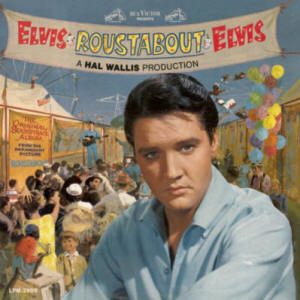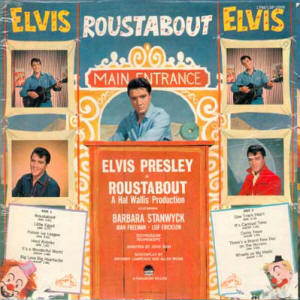

In October 1964, four weeks before
Paramount's "Roustabout" was rolled out
nationwide, RCA Victor released the accordant
soundtrack album. It entered the "Top LPs Chart"
on November 14th, was listed for 27 weeks and
peaked at number one. In its initial sales
period RCA Victor retailed 450,000 copies,
worldwide the longplayer sold 3.75 million
copies. Translated to the present the amount of
physical sales equals 562.5 million paid streams
of the compleate album or 5.63 billion paid
streams of individual tracks. The RIAA honored
the domestic sales with a Gold Award in 1988.
With the exception of the greatest hits album
"Elvis' Golden Records - Volume 3" this
soundtrack was the king's most successful
longplayer since 1962.
In 2016 the complete Presley catalogue was
restored and remastered by Vic Anesini for a
boxed set of 60 compact discs called "The Album
Collection". Sony Music Entertainment provides
the streaming platforms with the same versions
of the individual albums (some of them offering
bonus tracks), albeit in 24 bit/90 khz flac.
That means, if the platform of your choice
supports high resolution audio, you can enjoy
the tracks in the same quality Sony used to scan
and master them. On Spotify, which has a market
share of approximately 30% and is the only
platform that publishes streaming figures,
"Roustabout" accumulates less than 5
million streams and is requested 1,600 times per
day. So the situation has vastly changed since
the 1960s. While the combination of the movie
and the music turned "Roustabout" into a sales
hit, the music alone doesn't attract too many
people.
Elvis poses in a similar way like he had done
for the cover of the "Loving You" album. In both
cases he wanted to emphasize the rebellious
character he was portraying in the movie. But it
wasn't 1957 anymore and instead of looking like
a mean rocker he gives the impression of an
office clerk on a bad day. But in general the
artwork is nicely done, with four additional
promo photos on the backside.
The soundtrack was recorded on March 2nd and
3rd 1964 at Radio Recorders in
Hollywood/California. The sessions were produced
by Joseph Lilley and engineered by Dave
Weichman. Elvis' band consisted of Scotty Moore
(guitar), D.J. Fontana (drums), Hilmer J.
Timbrell (guitar), Billy Strange (guitar),
Barney Kessel (guitar, on March 2nd only), Bob
Moore (bass), Hal Blaine (drums), Murray Harman
(drums), Floyd Cramer (piano) and Homer Randolph
(saxophone). The harmony vocals were provided by
The Jordanaires (Gordon Stoker, Hoyt Hawkins,
Neal Matthews and Ray Walker). Even though the
soundtrack only has a running time of 20:05
minutes, RCA Victor didn't add any bonus tracks.
Compared to "Kissin' Cousins" or "It Happened At
The World's Fair" the audio mix is much better
here.
In 2017 Follow That Dream records released a
collector's edition of "Roustabout". For a
review tap
HERE.
Roustabout
The album begins with a song by Bill Giant,
Bernie Baum and Florence Kay. It was ordered
after Hal B. Wallis suddenly had raised concerns
regarding the lyrics of "I'm A Roustabout", the
original title song of the movie. It had been
written by Otis Blackwell and Winfield Scott and
was thought to be lost, some people even
claimed, that Elvis had never recorded the track
at all. In fact he had done so on March 3, 1964
within six takes. The final proof was delivered
by Winfield Scott himself, who offered an
acetate to Sony/BMG almost 30 years after the
session. The recording finally was released in
2003 on the compilation album "2nd To None". The
music track for the new title song was recorded
on May 29, 1964. The personnel was more or less
the same, albeit Bob Moore, D.J. Fontana, Hal
Blaine and Floyd Cramer were substituted by Ray
Siegel, Bernie Mattinson and Dudley Brooks.
Because The Jordanaires also were not available,
The Mello Men (Thurl Ravenscroft, Bill Lee, Bill
Cole and Max Smith) were booked instead. Elvis
added his voice on May 14, 1964. The master is
an edit of the takes 11 (music track) and 17
(vocal track). In the song the narrator
describes himself as an unsteady character, who
roams from town to town, but hopes to find his
place someday. "Roustabout" is a nice popsong,
much better than many other songs by
Giant/Baum/Kaye.
Little Egypt
For "Roustabout" Elvis covered The Coaster's
"Little Egypt". The group had released the track
in 1961, the writers are Jerry Leiber and Mike
Stoller, with whom the king had worked closely
in the 1950s. On March 2, 1964 he recorded 15
takes and approved the final one for release.
Nevertheless he taped six more on the following
day, but stayed with his decision. However, the
movie version was a splice of the takes 15 and
21 and was enhanced with further instruments. In
the song the narrator visits a show of a female
dancer named Little Egypt, captures her heart
and later produces 7 (!) children with her. The
lyrics offer the typical humor of Leiber and
Stoller (the description of Mrs. Egypt's show is
quite entertaining) and the melody is nice, too.
Compared to The Coaster's version Elvis'
performance is smoother, it has a better flow.
The king re-recorded the song in 1968 for his tv
special "SINGER presents Elvis". For me "Little
Egypt" is the highlight of the album.
Poison Ivy League
Once more we get a typical movie tune, again
written by Bill Giant, Bernie Baum and Florence
Kaye. The lyrics make fun of rich students, who
buy their university degree and make a career in
daddy's company. In the movie the song is
performed for exactly this type of people and so
the scene ends with a brawl. The song offers a
nice melody and funny lyrics. On March 2, 1964
Elvis needed seven takes to record "Poison Ivy
League".
Hard Knocks
The singer bewails his life full of privation. A
few years earlier "Hard Knocks" might have
become a rock'n'roll song, in 1964 it was
nothing but a fast pop tune. Nevertheless it's a
good song and Elvis performs it well. He did so
on March 2, 1964 within 11 takes. The writer of
"Hard Knocks" is Joy Byers.
It's A Wonderful WorldThis
happy-go-lucky-tune was written by Sid Tepper
and Roy C. Bennett. It's quite bland and doesn't
stay with you at all. It's somewhat of a mystery
why Elvis needed 13 attempts to record a track
like this. He did so on March 2, 1964.
Big Love Big Heartache
This catchy ballad was written by Dolores
Fuller, Les Morris and Sonny Hendrix and can be
considered a highlight of this album. The king
taped it on March 3, 1964 within 17 takes.
One Track Heart
Here we have another song by Bill Giant, Bernie
Baum and Florence Kaye. This time the trio
delivered a nice, but also bland uptempo tune.
Elvis needed five takes to record "One Track
Heart" on March 3, 1964.
It's Carnival TimeCharlie
(Elvis) sings the song to convince the people to
buy tickets for the show, but I doubt that it
would work in real life. For me "It's Carnival
Time" is the worst song of the album. The king
himself also didn't seem to be too interested in
the tune by Ben Weisman and Sid Wayne, because
he had the musicians record an instrumental
track and added his voice later. The master is a
splice of the takes 2 (rhythm track) and 9
(vocal track). Both parts were recorded on March
3, 1964.
Carny TownThe intention is
the same, but this time the idea might work out
better. The melody is catchy and the lyrics
describe the show acts in a humorous way. "Carny
Town" was written by Fred Wise and Randy Starr
and recorded by Elvis on March 3, 1964 within
nine takes.
There's A Brand New Day On The Horizon
The finale of the movie was written by Joy Byers
and is based on a traditional named "Snake Pit".
On March 3, 1964 the king needed five attempts
to deliver a releasable performance. For me
"There's A Brand New Day On The Horizon" belogs
to the highlights of this album, because it's a
real "earworm".
Wheels On My Heels
The album closes with an uptempo popsong by Sid
Tepper and Roy C. Bennett. It was recorded on
March 3, 1964 within seven takes. When Elvis
requested The Jordanaires on the track, Jeseph
Lilley asked him, where the voices should come
from, because in the movie he would sing the
song while riding a motorbike. The king's answer
was right on the spot: From the same damn place
the music is coming from!
Verdict
This longplayer doesn't play all that
long and a lot of the tracks are somewhat
bland. But everything is executed well,
regarding the technical realization and the
performances, and there are also a few tunes
that are really good.

(C) RCA Victor
![]()

